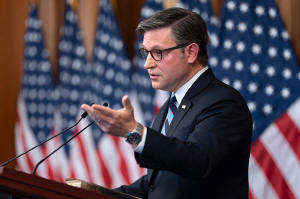Government shutdown drags on as health care compromise remains elusive
[October 08, 2025]
By MARY CLARE JALONICK, LISA MASCARO and KEVIN FREKING
WASHINGTON (AP) — To hear party leaders talk, the seventh day of the
government shutdown sounded a lot like the first. Democrats are seeking
negotiations on expiring health care subsidies while Republicans say
they won't discuss it, or any other policy, until the government
reopens.
The two sides are also offering starkly different visions of the
Affordable Care Act and how to deal with the expanded premium assistance
that will soon expire for millions of people — Democrats want the aid
extended, while Republicans insist the subsidized health care system is
broken and must be cut back.
“Democrats’ position has not changed,” said Senate Democratic Leader
Chuck Schumer. “We want the same thing that a majority, an overwhelming
majority, of Americans want, which is to end this shutdown and halt the
health care crisis that will send premiums spiking for tens of millions
of people.”
House Speaker Mike Johnson, R-La., met with Senate Republicans on
Tuesday and said the party is “100% united,” which he said is “a good
place to be in.”
It's unclear how the impasse will end, even as hundreds of thousands of
federal workers are going unpaid and many government services are slowed
or suspended. Democrats believe the public is on their side as they
fight to keep the COVID-era subsidies, but health care is also one of
the most intractable issues in Congress — and a real compromise is
unlikely to be easy, or quick.
There are some Republicans in Congress who want to extend the aid as
millions of people who receive their insurance through the ACA
marketplaces are set to receive notices that their premiums will
increase at the beginning of the year. But many GOP lawmakers are
strongly opposed to any extension — and see the debate as a new
opportunity to try to reform the program.

“If Republicans govern by poll and fail to grab this moment, they will
own it,” wrote Texas Rep. Chip Roy, a Republican, in a letter published
in The Wall Street Journal over the weekend. He encouraged senators not
to go “wobbly” on the issue.
“The jig is up, the pandemic is over and my colleagues shouldn’t blink
in any other direction,” Roy wrote.
A long history of health care fights
Republicans have been railing against the Affordable Care Act, former
President Barack Obama’s signature health care law, since it was enacted
15 years ago. But while they have been able to chip away at it, they
have not been able to substantially alter it as a record 24 million
people are now signed up for insurance coverage through the ACA, in
large part because billions of dollars in subsidies have made the plans
more affordable for many people.
Now, some of them see the Democrats’ fight as their chance to revisit
the issue — putting Republican congressional leaders and President
Donald Trump in a complicated position.
“I am happy to work with Democrats on their Failed Healthcare Policies,
or anything else, but first they must allow our Government to reopen,”
Trump wrote on social media Monday night, walking back earlier comments
saying there were ongoing negotiations with Democrats.
Senate Majority Leader John Thune, R-S.D., told reporters Monday that
“there may be a path forward” on ACA subsidies, but stressed, “I think a
lot of it would come down to where the White House lands on that.”
Some GOP senators argue, though, that the only path forward is to
overhaul the law. “The whole problem with all of this is Obamacare,”
said Florida Sen. Rick Scott.
Johnson said there were ongoing talks about “pretty dramatic changes” to
the law that Congress might consider once the government reopens.
Bipartisan talks face difficulties
The Senate has now rejected a House-passed bill to extend government
funding until mid-November five times, with Democrats denying
Republicans the votes to pass it unless they win concessions on health
care.

[to top of second column]
|

With his personal Bible on the lectern, Speaker of the House Mike
Johnson, R-La., holds a news conference to mark the seventh day of
the government shutdown, at the Capitol in Washington, Tuesday, Oct.
7, 2025. (AP Photo/J. Scott Applewhite)

With leaders at odds, some rank-and-file senators in both parties
have been in private talks to try to find a way out of the shutdown.
Republican Sen. Mike Rounds of South Dakota has suggested extending
the subsidies for a year and then phasing them out. Senate
Appropriations Committee Chairwoman Susan Collins, R-Maine, has
suggested pushing ahead with a group of bipartisan spending bills
that are pending and then securing a commitment to discuss the
health care issue.
But many Democrats say a commitment isn’t good enough, and
Republicans say they need deeper reforms — leaving the talks, and
the U.S. government, at a standstill.
Maine Sen. Angus King, an Independent who caucuses with Democrats,
voted with Republicans to keep the government open. But he said
Monday that he might switch his vote to “no” if Republicans do not
“offer some real solid evidence that they are going to help us with
this crisis” on health care.
Republican Sen. Markwayne Mullin of Oklahoma said his party is “not
budging,” however.
“First and foremost, before we can talk about anything, they need to
reopen the government,” Mullin said.
Some Republicans urge action on health care
Still, some Republicans say they are open to extending the subsidies
— even if they don’t like them — as it becomes clear that their
constituents will face rising costs.
“I’m willing to consider various reforms, but I think we have to do
something,” said Republican Sen. Josh Hawley of Missouri. He said
Congress should address the issue “sooner rather than later” before
open enrollment begins Nov. 1.
Rep. Marjorie Taylor Greene, R-Ga., said she is “not a fan” of
Obamacare but indicated she might vote to extend it.
“I’m going to go against everyone on this issue because when the tax
credits expire this year my own adult children’s insurance premiums
for 2026 are going to DOUBLE, along with all the wonderful families
and hard-working people in my district,” she posted on social media
Monday evening.

High stakes for federal workers
With both sides digging in, the shutdown could go on for some time,
leaving federal workers without their regular paychecks. And the
White House is now suggesting that Trump may block back pay if the
government reopens.
Trump signed legislation into law in 2019 that ensures back pay for
federal workers during any government funding lapse. But a White
House memo with the rationale for no back pay is under
consideration.
Johnson told reporters Tuesday that he doesn't know the details of
the memo, but “if that is true, that should turn up the urgency and
the necessity of the Democrats doing the right thing here.”
Democrats pushed back on the White House rationale. “Federal
workers, including furloughed workers, are entitled to their back
pay following a shutdown,” said Washington Sen. Patty Murray, the
top Democrat on the Senate Appropriations Committee.
The White House also said Tuesday that it will use tariff revenue to
bolster the Special Supplemental Nutrition Program for Women,
Infants and Children, which is facing funding shortages because of
the shutdown.
Press secretary Karoline Leavitt said in a post on X that Trump has
“identified a creative solution to transfer resources” from tariffs
the administration has imposed on U.S. trading partners. She did not
provide details of how such funding transfers might work.
___
Associated Press writers Matt Brown, Stephen Groves, Will Weissert
and Joey Cappelletti contributed to this report.
All contents © copyright 2025 Associated Press. All rights reserved |